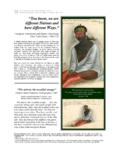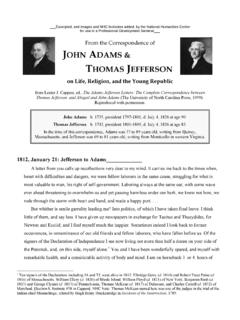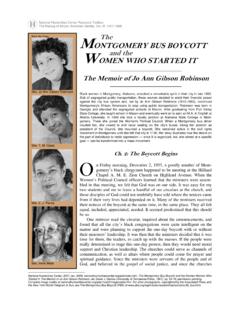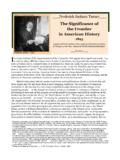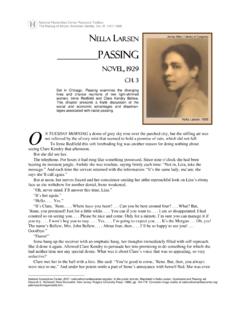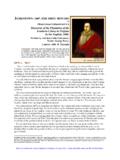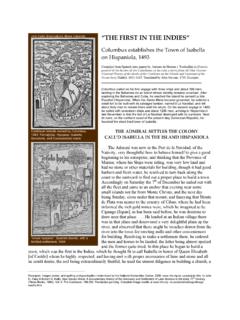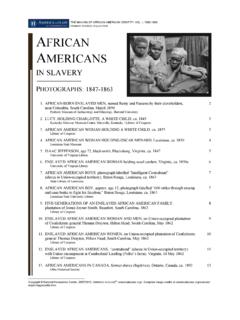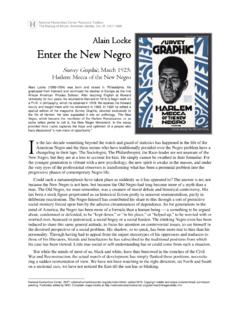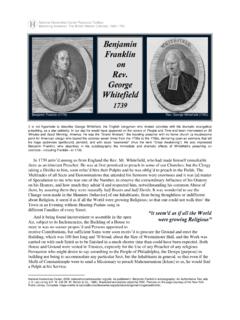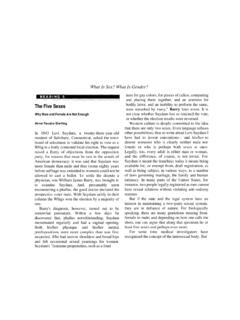Transcription of Judith Sargent Murray - National Humanities Center
1 ___Presented by the National Humanities Center for use in a Professional Development Seminar___ ___Judith Sargent Murray___ On the equality of the Sexes On the equality of the Sexes On the equality of the Sexes On the equality of the Sexes 1790 originally published in The Massachusetts Magazine, or, Monthly Museum of Knowledge and Rational Entertainment (March-April 1790) from Sharon M. Harris, ed., Selected Writings of Judith Sargent Murray (Oxford University Press, 1995). Reprinted with permission. Text of footnotes in this document by National Humanities Center . That minds are not alike, full well I know, This truth each day s experience will show; To heights surprising some great spirits soar, With inborn strength mysterious depths explore; Their eager gaze surveys the path of light, Confest it stood to Newton s piercing sight. Deep science, like a bashful maid retires, And but the ardent breast her worth inspires; By perseverance the coy fair is won.
2 And Genius, led by Study, wears the crown. But some there are who wish not to improve, Who never can the path of knowledge love, Whose souls almost with the dull body one, With anxious care each mental pleasure shun; Weak is the level d, enervated mind, And but while here to vegetate design'd. The torpid spirit mingling with its clod, Can scarcely boast its origin from God; Stupidly dull they move progressing on They eat, and drink, and all their work is done. While others, emulous of sweet applause, Industrious seek for each event a cause, Tracing the hidden springs whence knowledge flows, Which nature all in beateous order shows. Yet cannot I their sentiments imbibe, Who this distinction to the sex ascribe, As if a woman's form must needs enrol, A weak, a servile, an inferiour soul; And that the guise of man must still proclaim, Greatness of mind, and him, to be the same: Yet as the hours revolve fair proofs arise, Which the bright wreath of growing fame supplies; And in past times some men have sunk so low, That female records nothing less can show.
3 But imbecility is still confin d, And by the lordly sex to us consign'd; They rob us of the power t'improve, And then declare we only trifles love; Yet haste the era, when the world shall know, That such distinctions only dwell below; The soul unfetter'd, to no sex confin d, Was for the abodes of cloudless day design d. Mean time we emulate their manly fires, Though erudition all their thoughts inspires, Yet nature with equality imparts, And noble passions, swell e en female hearts. Murray Society Judith Sargent Murray s it upon mature consideration we adopt the idea, that nature is thus partial in her distributions? Is it indeed a fact, that she hath yielded to one half of the human species so unquestionable a mental superiority? I know that to both sexes elevated understandings, and the reverse, are common. But, suffer me to ask, in what the minds of females are so notoriously deficient, or unequal.
4 May not the intellectual powers be ranged under these four heads imagination, reason, memory and judgment. The province of imagination hath long since been surrendered up to us, and we have been crowned undoubted sovereigns of the regions of fancy. Invention is perhaps the most arduous effort of the mind; this branch of imagination hath been particularly ceded to us, and we have been time out of mind invested with that creative faculty. Observe the variety of fashions (here I bar the contemptuous smile) which distinguish and adorn the female world; how continually are they changing, insomuch that they almost render the whole man's assertion problematical, and we are ready to say, there is something new under the sun. Now, what a playfulness, what an exuberance of fancy, what strength of inventive imagination, doth this continual variation discover? Again, it hath been observed, that if the turpitude of the conduct of our sex, hath been ever so enormous, so extremely ready are we, that the very first thought presents us with an apology, so plausible, as to produce our actions even in an amiable light.
5 Another instance of our creative powers, is our talent for slander; how ingenious are we at inventive scandal? what a formidable story can we in a moment fabricate merely from the force of a prolifick imagination? how many reputations, in the fertile brain of a female, have been utterly despoiled? how industrious are we at improving a hint? suspicion how easily do we convert into conviction, and conviction, embellished by the power of eloquence, stalks abroad to the surprise and confusion of unsuspecting innocence. Perhaps it will be asked if I furnish these facts as instances of excellency in our sex. Certainly not; but as proofs of a creative faculty, of a lively imagination. Assuredly great activity of mind is thereby discovered, and was this activity properly directed, what beneficial effects would follow. Is the needle and kitchen sufficient to employ the operations of a soul thus organized?
6 I should conceive not. Nay, it is a truth that those very departments leave the intelligent principle vacant, and at liberty for speculation. Are we deficient in reason? we can only reason from what we know, and if opportunity of acquiring knowledge hath been denied us, the inferiority of our sex cannot fairly be deduced from thence. Memory, I believe, will be allowed us in common, since every one's experience must testify, that a loquacious old woman is as frequently met with, as a communicative old man; their subjects are alike drawn from the fund of other times and the transactions of their youth, or of maturer life, entertain, or perhaps fatigue you, in the evening of their lives. But our judgment is not so strong we do not distinguish so well. Yet it may be questioned, from what doth this superiority, in this determining faculty of the soul, proceed.
7 May we not trace its source in the difference of education, and continued advantages? Will it be said that the I 3 judgment of a male of two years old, is more sage than that of a female s of the same age? I believe the reverse is generally observed to be true. But from that period what partiality! how is the one exalted and the other depressed, by the contrary modes of education which are adopted! the one is taught to aspire, and the other is early confined and limited. As their years increase, the sister must be wholly domesticated, while the brother is led by the hand through all the flowery paths of science. Grant that their minds are by nature equal, yet who shall wonder at the apparent superiority, if indeed custom becomes second nature; nay if it taketh place of nature, and that it doth the experience of each day will evince. At length arrived at womanhood, the uncultivated fair one feels a void, which the employments allotted her are by no means capable of filling.
8 What can she do? to books she may not apply; or if she doth, to those only of the novel kind, lest she merit the appellation of a learned lady; and what ideas have been affixed to this term, the observation of many can testify. Fashion, scandal, and sometimes what is still more reprehensible, are then called in to her relief; and who can say to what lengths the liberties she takes may proceed. Meantime she herself is most unhappy; she feels the want of a cultivated mind. Is she single, she in vain seeks to fill up time from sexual employments or amusements. Is she united to a person whose soul nature made equal to her own, education hath set him so far above her, that in those entertainments which are productive of such rational felicity, she is not qualified to accompany him. She experiences a mortifying consciousness of inferiority, which embitters every enjoyment.
9 Doth the person to whom her adverse fate hath consigned her, possess a mind incapable of improvement, she is equally wretched, in being so closely connected with an individual whom she cannot but despise. Now, was she permitted the same instructors as her brother, (with an eye however to their particular departments) for the employ-ment of a rational mind an ample field would be opened. In astronomy she might catch a glimpse of the immensity of the Deity, and thence she would form amazing conceptions of the august and supreme Intelligence. In geography she would admire Jehova in the midst of his benevolence; thus adapting this globe to the various wants and amusements of its inhabitants. In natural philosophy she would adore the infinite majesty of heaven, clothed in condescension; and as she traversed the reptile world, she would hail the goodness of a creating God.
10 A mind, thus filled, would have little room for the trifles with which our sex are, with too much justice, accused of amusing themselves, and they would thus be rendered fit companions for those, who should one day wear them as their crown. Fashions, in their variety, would then give place to conjectures, which might perhaps conduce to the improvement of the literary world; and there would be no leisure for slander or detraction. Reputation would not then be blasted, but serious speculations would occupy the lively imaginations of the sex. Unnecessary visits would be precluded, and that custom would only be indulged by way of relaxation, or to answer the demands of consanguinity and 4 friendship. Females would become discreet, their judgements would be invigorated, and their partners for life being circumspectly chosen, an unhappy Hymen1 would then be as rare, as is now the reverse.
